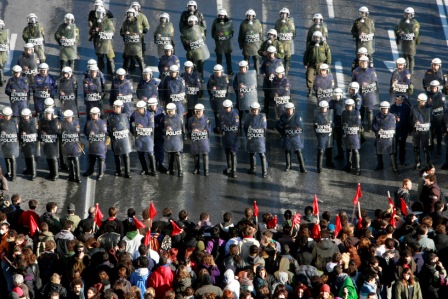This trio, the original form of PPP, has been the anvil of society since time immemorial. Some of the protests have acquired iconic status, with or without obtaining their aims. The riots heralding the French revolution might (though not unequivocally) be put in the former category, while the multi country protests of the 1920s against the execution of Sacco and Vanzetti in the USA belong to the latter. The European protests, spearheaded in Germany, around 2014/2015 against the draft Transatlantic Trade and Investment Treaty (TTIP) look to have achieved their aim, with President Trump subsequently playing the decisive role of undertaker in burying the scheme. Single subject protests, reinforced by splendid command of the material and good organization, can and frequently do work.
The decade now ending has offered a veritable pyrotechnic display of protests on the global scale. In mid – 2011 , Occupy Wall Street hit out against the ravages caused by global financial speculation and mismanagement (hardly a new theme). At the same time, Los Indignados in Spain were appealing for a different social order (likewise not a novel claim). Elsewhere that same year western media, seizing on major demonstrations in Tunisia and Egypt, were hailing “the Arab Spring”, a period that turned out to be one of the shortest seasons on record and whose labelling confirmed the fatal western blindness to the realities of other parts of the world. In fact the outcomes of those brave efforts have been to reinforce the Pharaonic tradition in Egypt (ISIS and SISI are palindromes), and a situation of confusion, though with plenty of authoritarian factors, in Tunisia. During this year sustained weekly protests in Algeria have sought to dislodge the gerontocratic and kleptocratic regime, yet the outcomes remain profoundly unclear. On 12 December the protests actually sought a boycott ( highly successful) of elections for the Presidency (all candidates were Bouteflika derivatives), and even reached the point where some polling centers were ransacked and the ballot papers literally thrown into the street. Fake representative democracy clearly is unacceptable.
The final quarter of 2019 has offered a staggering concentration of protests. In November the first anniversary of “Les Gilets Jaunes” prompted reflection on what remains of the demands made in these long sustained and France wide mobilizations (dramatically emphasized by the strikes concerning les retraites going on as I write). Cataluna predictably reinforced it’s hallmark demonstrations, with grievances exacerbated by the verdicts of imprisonment rendered in October in the trials against key Catalan independence political leaders. Along the Andean region, massive protests against austerity (Chile, Ecuador, Colombia) and apparently against suspicions of rigged elections (Bolivia) have plunged much of the region into yet another cycle of the perennial struggle over inequality that has characterized these countries. Cosmetic democracy as against real change remains top of the cosmetic agenda. In Venezuela, on the other hand, the protest wave starting some 12 months ago has subsided considerably, with still no resolution in sight. Meantime, it has provoked what is currently the world’s largest refugee crisis – and also the one receiving the least external funding. Hong Kong erupted at just the time when China was celebrating the 70th anniversary of the Communist regime, with its protagonists providing an exceptionally powerful example of how to fight when the odds are stacked against you. Those protest too continue on a regular basis. Indeed, in many places there are large numbers of people whose weekly agenda has a day marked “Protest”.
Back in Europe, Italy continued its protest tradition in a somewhat innovative fashion. I Sardine (so called because their initial gathering in the time honored home of protest, Bologna, found the thousands of people packed like sardines) are not against the actual government (a polite word for the multi- hued set currently offering a decidedly cacophonous version of “Vesti la Giubba”), but decry the language and measures set out by the political opposition, as represented by Matteo Salvini and Georgia Meloni (Forza Italia of Berlusconi has effectively split, and is now a hanger on looking for a group to join up with – it does not play a role in protests). This very new, and country wide, phenomenon, might however extend its protest message to include the nominal head of Il Movimento Cinque Stelle, who is fast adopting ever more strident tones on the Salvini strada. Indeed, with profound apologies to Federico Fellini, the Di Maio/Salvini implicit pact is increasingly and ironically characterized as “Amarcord” (which is a dialect word for “I remember”, though deliberate forgetfulness would be a far more accurate description of the mental processes of the two politicans).
Is it possible to trace continuities and discontinuities within and across this very wide spectrum? Can any real messages be extracted and used? My answers to both questions are in the affirmative. Let’s see why.
There are three, often interlinked, issues which appear at the center of a very large majority of protests, wherever and whenever they occur. They are: worsening economic and social conditions for either the majority of the population or a significant segment of it; strong feelings about political oppression and/or threats to whatever freedoms a population may have; and political corruption, which can cover a multitude of sins. The first can be sparked by changes in specific economic policies, of which a key element is usually measures that affect the price/cost of things important in the budgets and livelihoods of less well-off households. In this decade, and especially in the last two years, the examples are manifold. Rises in fuel and transport prices are at the center of current protests in Chile, Colombia, Iran and were crucial in the genesis of les gilets jaunes. In many places hikes in the retail prices of staple commodities (bread, rice, right now onions in India) drove large scale protests. Both areas are almost always at the center of austerity measures. They have been a permanent part of the standard IMF package, which is the doctrinally authorized version of austerity and is adopted by governments representing international financial interests. Indeed, so ubiquitous is this approach that the French language acronym for the institution, FMI, is sometimes translated as “forum des manifestations internationales”. Some though not all protests driven by “austerity anguish” metamorphose into proposals for systemic change. These tend to be resisted by the governments and often produce violent events. With the gilets jaunes, however, the government of President Macron responded in two unusual ways. There was a quick volte-face on the financial side, promising to inject billions of Euros into channels expected to alleviate some of the hardships causing anger (though the fuel tax remained at the center of debate). At the same time the President called for, and was personally instrumental in conducting, a national debate lasting three months on the matters at the source of the problems.
The second issue covers a range of problems, which tend to be country or region specific and are often the current version of long standing grievances and concerns. Iran has now gone 40 years since the overthrow of the Shahanshah. The rigidity of the new system in effect paralleled the rigidity under the absolute emperor, so has been regularly resisted by substantial segments of the population. In this case, foreign affairs have weakened the position of the regime on the economic front. Hence we now have a situation where economic sanctions shaped by the USA (and its power to pull a number of others along with it) have contributed to a sharp deterioration of the economy. Politically driven protest is accentuated by economic grievances.
Cataluna is quite different. There too the independence movement goes back some way. The fact that in the Spanish Civil War the armed rebellion led by General Franco took aim against a republican government which was strongly marked by ideas and policies conceived and implemented by leading Catalans has certainly been a powerful force driving resentment against Madrid. The ferocious repression enacted in Cataluna (and elsewhere) over decades by the Franco government has not been, and should not be, forgotten. Over the past 30 years, and in the absence of any fully fledged national initiatives to address the pre and post- civil war divides in Spanish society and build a real consensus, that resentment has festered and led to ongoing crisis. Protests have traditionally been peaceful, notwithstanding one or two small isolated incidents in recent weeks. Within Cataluna independistas are not in a majority, but they are more than strong enough to break most efforts at negotiated solutions. Just a few weeks back some 250 more or less known persons, from Spain and elsewhere, signed a letter calling for just that, a negotiated solution. But the chances remain slim, and protest will continue.
Hong Kong offers a different scenario. It is now 20 years since the inauguration of the “one country, two systems” method, through which a 50 year period was established for Hong Kong to adopt its own economic approach and to have certain political freedoms which were not present in China itself. The protests of the past couple of months were initiated because many, probably most, residents of Hong Kong believe that Beijing was seeking to curtail freedoms in Hong Kong through the move to dispatch people to China for a certain set of legal trials. Here violence has been a central feature of the protests, with the usual vicious circle of retaliation from all sides. The response of the authorities has been multi-faceted. The proposed new law has been withdrawn. Within China the riots have been depicted in the media as proof of the decadent behavior that occurs within “Western type” societies. China has responded strongly to the rather feeble moves by the Trump administration (not known for its defense of foreign –or for that matter national – political protesters) to criticize its actions. The scheduled elections for the Hong Kong Council were held at end November and resulted in a massive (83%) vote in favor of the democratic freedoms platform of the protesters. Yet at the same time China is acutely aware that the specificities of its involvement, and that of Chinese firms, in the international economy mean that its access to the financial benefits offered by the Hong Kong status are of major importance. Geopolitics and geofinance therefore play a central role in determining how much protest will affect local politics.
The third issue is corruption. Granted the accusation is a staple in the vocabulary of pretty much every group seeking decisive splits from the existing casta. Granted also that it is very frequently tossed around by everybody, with mutual accusations the norm rather than the exception. But there are nevertheless a fair few cases where political and economic corruption are very real and not bogus. Take Malta right now. It has been an open secret, since well before the murder of Daphne Caruana, that the government was corrupt on all fronts. But in ordering the murder of the remarkable journalist it went over the edge. The protests of recent days, calling for the immediate resignation of Prime Minister Joseph Muscat, demand major change. And in this case they are very likely obtain it. In a tiny island (this writer is Irish, so has some practical experience) it is exceptionally difficult to try and siphon off huge sums of money and nurture suspect foreign collaborators without everybody noticing. In the islands, neither financial deals nor political manipulations are conducted at the utopian “arms length”. For Europeans/Mediterraneans to imagine they can create a kind of “Papa Doc Duvalier” system is wishful thinking of the highest order. These protests will be effective. In Rumania the protests against corruption have been successful. The attempts of the previous government to brand Mme Kelesi, the outstanding leader of the anti-corruption part of the administration, as herself corrupt have failed dismally. In future it will be more difficult for a Rumanian government to repeat the trick.
A glance across the examples cited suggests that protests can be within or across countries, can respond to specific issues of long duration (yet also “new” issues, of which climate change is the most obvious), and exhibit fast growing signs of organizational sophistication. Information technology has been a major aid to protesters (though simultaneously augmenting the control/repression arsenal of governments). It seems as if “Tsunami Democratic” in Cataluna is leading edge in terms of organizational skill. It employs apps which allow it to guide many protests in different places at the same time, whilst ensuring that each of the protests harnesses specific local (micro) features yet propounds the same general message. In this it would seem that it may have drawn from the core algorithms of Google, as the search giant has relentlessly perfected its predictive behavior products (sold to its advertisers). The physical and highly visible form that protests now take is thus drawing on technologies which, at the beginning of the decade, were being used either in the commercial sphere alone, or were diffusing often incoherent messages at the political level. The risk that protests can be manipulated has always been present (how many examples of people being transported into crowds and been paid for their efforts can you think of?). It is very much alive today. With it, comes the risk that protests can produce highly perverse political impacts (right now the debate on whether the Bolivia situation is in fact a coup d’etat thinly disguised as protest is ongoing). That is also nothing new. But the overall impression is that protest efforts could well be increasing their positive leverage in the political sphere and making some impact on the uses and exercise of power. They should be seen as one of the several factors destined to transform the performance of democracy in the coming decade.
Peter O’Brien, Brussels, 17 December, 2019





